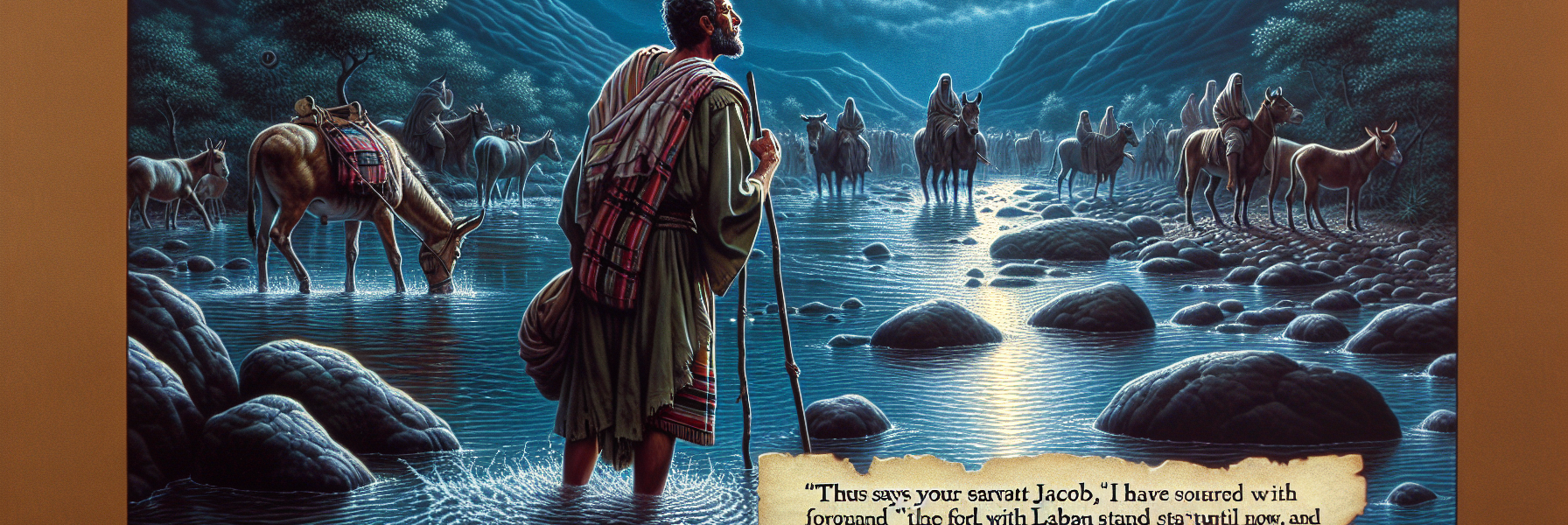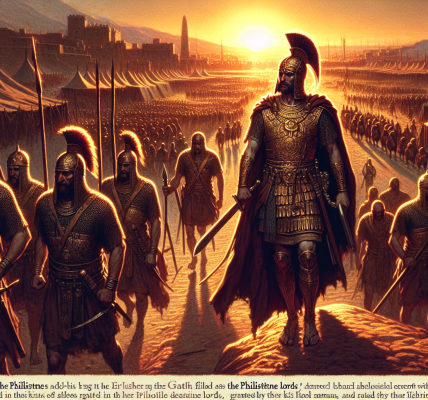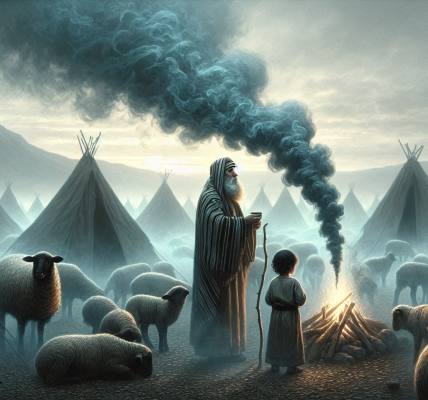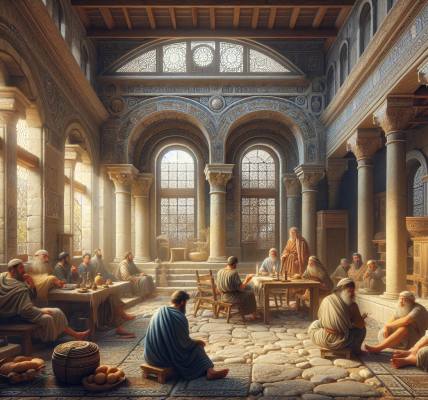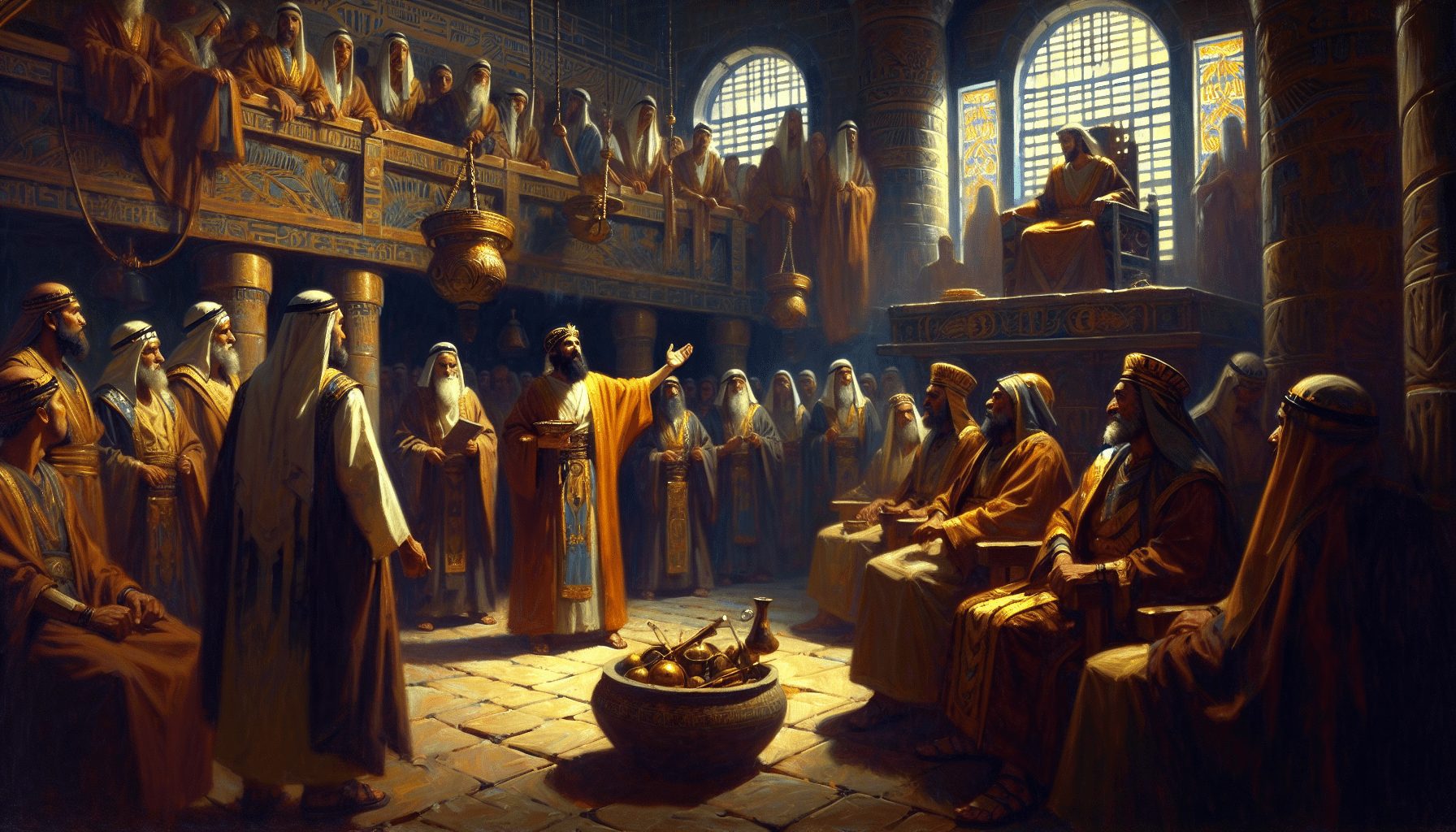**A Night of Wrestling: Jacob’s Transformation at Peniel**
The night was thick with tension as Jacob stood alone by the ford of the Jabbok River. The waters rushed with a restless murmur, mirroring the turmoil in his heart. Twenty years had passed since he had fled from his brother Esau’s wrath, and now, at last, he was returning to the land of his father, Isaac. But the dread of meeting Esau again weighed upon him like a millstone.
Earlier that day, Jacob had sent messengers ahead to his brother, bearing words of humility: *”Thus says your servant Jacob, ‘I have sojourned with Laban and stayed until now. I have oxen, donkeys, flocks, male servants, and female servants. I have sent to tell my lord, that I may find favor in your sight.’”* (Genesis 32:4-5). The messengers had returned with alarming news: Esau was coming to meet him—with four hundred men. Fear seized Jacob. Was this an army marching to exact vengeance for the stolen blessing?
Desperate, Jacob divided his household into two camps, reasoning that if one were attacked, the other might escape. Then he bowed low in prayer, his voice trembling as he cried out to the God of his fathers: *”O God of my father Abraham and God of my father Isaac, O Lord who said to me, ‘Return to your country and to your kindred, and I will do you good,’ I am not worthy of the least of all the deeds of steadfast love and all the faithfulness that you have shown to your servant… Deliver me, I pray, from the hand of my brother, from the hand of Esau, for I fear him, that he may come and attack me, the mothers with the children.”* (Genesis 32:9-11).
Having prayed, Jacob acted with shrewdness, selecting a lavish gift for Esau—two hundred female goats, twenty male goats, two hundred ewes, twenty rams, thirty milking camels with their colts, forty cows, ten bulls, twenty female donkeys, and ten male donkeys. He divided them into droves, instructing his servants to go ahead, each group at a distance from the next, so that the sight of so many animals might soften Esau’s heart.
As darkness fell, Jacob sent his two wives, Leah and Rachel, his eleven sons, and all his possessions across the Jabbok. But he himself remained behind, alone in the stillness of the night.
Then, without warning, a figure emerged from the shadows—a man of formidable presence, his form indistinct yet radiating power. Before Jacob could react, the stranger seized him, and the two began to wrestle. The struggle was fierce, bone against bone, breath ragged in the cool night air. Jacob, though weary from years of labor, fought with all his strength, refusing to yield.
Hour after hour, they grappled, neither gaining the upper hand. Then, as the first hints of dawn tinged the horizon, the stranger touched Jacob’s hip, and with a mere brush of his hand, the joint was wrenched from its socket. Pain shot through Jacob’s body, yet still he clung to the man, his fingers digging into the stranger’s cloak.
*”Let me go, for the day has broken,”* the man said.
But Jacob, panting, replied, *”I will not let you go unless you bless me.”*
A silence hung between them. Then the stranger spoke again, his voice carrying divine authority: *”What is your name?”*
*”Jacob,”* he answered—the name that meant *”supplanter,”* the name that spoke of his deceit, his grasping nature.
The stranger’s next words struck Jacob’s heart like a hammer upon an anvil: *”Your name shall no longer be called Jacob, but Israel, for you have striven with God and with men, and have prevailed.”*
Jacob’s breath caught. *Israel—”he who struggles with God.”* This was no ordinary man he had wrestled. This was the Lord Himself, meeting him in the form of a man, testing him, refining him.
Trembling, Jacob stammered, *”Please tell me your name.”*
But the stranger replied, *”Why is it that you ask my name?”* And with that, He blessed Jacob—no, Israel—there by the river.
As the first light of dawn broke fully over the land, the mysterious figure vanished. Jacob—now Israel—stood alone, his body aching, his hip dislocated, yet his spirit transformed. He limped away from Peniel, the place he named *”The Face of God,”* for he said, *”I have seen God face to face, and yet my life has been delivered.”*
The sun rose higher, casting golden rays over the land. Israel’s fear of Esau remained, but something deeper had shifted within him. No longer was he merely Jacob the deceiver; he was Israel, the one who had wrestled with God and emerged changed.
And so, leaning on his staff, he crossed the Jabbok to meet his brother—not as a fugitive, but as a man marked by divine encounter, ready to face whatever lay ahead.
